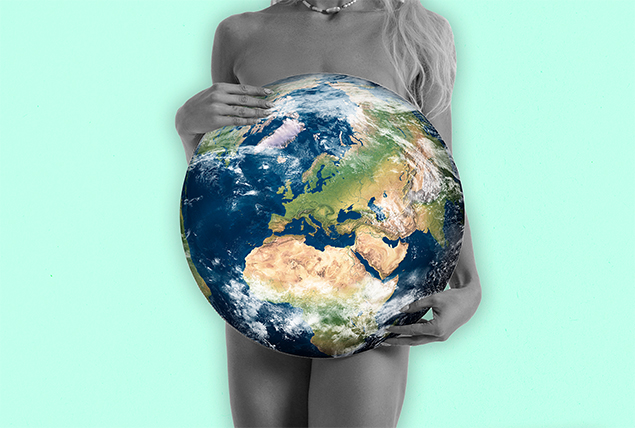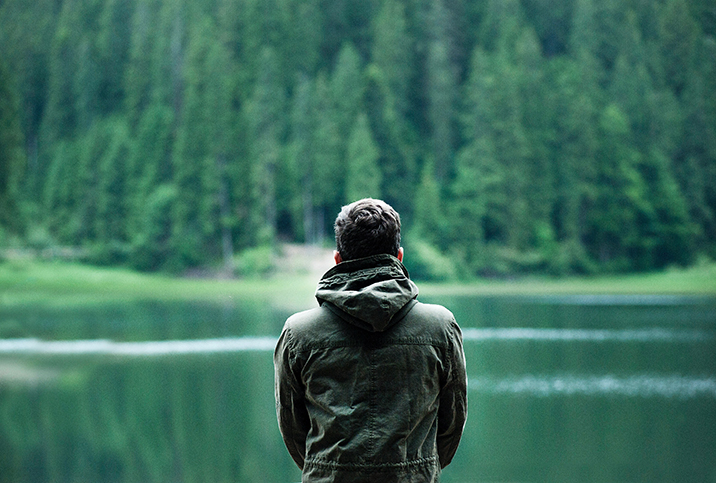What Does It Mean to Be an Ecosexual?

"There's a lot to love about sex," Stefanie Iris Weiss wrote in her book, "Eco-Sex: Go Green Between the Sheets and Make Your Love Life Sustainable." "Unfortunately, once you peel back the rumpled sheets of your love life, you'll uncover a messy landscape littered with potential eco-hazards, needless waste and planet-crushing pollution."
In her book, Weiss urges people to think about the environmental impact of everything that goes into their lovemaking. Opt for plant-based lubes. Ride a bike to a date instead of driving. Maybe don't have children, thus limiting future humans' carbon footprint.
"If you don't, in a few decades you might not have time for sex—you'll be too busy searching for food or escaping from coastal flooding, hurricanes, drought and general blight," Weiss wrote.
She said she decided to write her book after talking to her friends and discovering that their environmentalism "ended in their pelvic region." Conversely, she said she believes protecting the environment should be inextricably linked with our sex lives.
Weiss is one of the founders of what has become known as the "ecosexual" movement. For some, being an ecosexual signifies a commitment to a greener sex life. For others, it's about feeling aroused by nature.
However the movement is defined, Weiss said she's never met an ecosexual who doesn't care about the environment.
Could you think of eco-sex as an art movement?
In 2010, while Weiss was writing her book, her editor put her in contact with Annie Sprinkle, a former sex worker and certified sexologist, and Beth Stephens, an artist and college professor, who happened to be promoting a similar message through performance art. Sprinkle and Stephens published a manifesto on eco-sex in 2011. In it, they declared, "The Earth is our lover."
Weiss isn't sure whether she, Sprinkle or Stephens coined the term "ecosexual," but the idea of nature being sexy isn't new. For instance, poets have written about it for years. Think of the famous line from Pablo Neruda's poem "Every Day You Play": "I want to do with you what spring does with the cherry trees."
Emili Lemon is a feminist ecosexual erotica writer who lives on a sailing yacht in the South Pacific islands. She thinks branding the notion that nature is sexual as eco-sex is simply, "a modern reimagining of ancient wisdom about our intimate relationship to our environment."
Nature is a natural aphrodisiac
Many ecosexuals attest to feeling turned on by nature. Suzannah Weiss (no relation to author Stefanie Iris Weiss), an AASECT-certified sex educator in Los Angeles and resident sexologist for the ethical porn platform FrolicMe, said she realized she was an ecosexual after spending several years disappointed by her dating life. She said she found herself lying on the beach one day and believed she could feel the light from the sun affecting her sensually.
"I felt subtle orgasmic waves rippling throughout me," she said.
She now helps people have the same experience through meditation.
Lemon said she practices her brand of ecosexuality by walking barefoot in nature while wearing as few clothes as she can get away with. For her, the most sensual experience is swimming in the tropical ocean, "feeling my body working while being caressed and welcomed all over."
Even an otherwise frightening, close encounter with a shark elicited a deep, genital feeling, she added.
"Getting out of the water is also exciting," she said. "The frisson of cool air [bringing] sharp arousal to all my most arousable parts."
Greta Jane is a certified somatic intimacy educator in Seattle. She doesn't just identify as an ecosexual but as a "cosmosexual." She is in love with the universe and finds nature to be an aphrodisiac.
"I'll be in the forest or in the park or even in my own garden, and my desire to exchange touch with nature is really strong," Jane said.
She is especially turned on by flowers and likes rubbing them on her naked body. She enjoys helping petals in their ovulation state—on the point of falling off—to drop in what she calls a "petal orgasm."
While Suzannah Weiss said her primary motivation for connecting sexually with nature didn't originate through an environmentalist impulse, she said she feels it's led to a greater concern for nature because it's helped her realize she's connected to it.
Jane's environmentalism emerges from a similar space.
"By embodying our erotic selves in nature, we see that the destruction happening to this planet is also happening to us," she said. "We are the Earth."
The controversy surrounding eco-sex
Despite honoring a deeper connection to nature and advocating for a more sustainable future, eco-sex is not without its critics. Some view ecosexuals as self-indulgent adherents of frivolous woo-woo. A segment of the activism community sees focusing on the erotic pleasures of nature while the earth is in peril as in bad taste, even insulting.
"We’ve ravaged all the resources on our little space rock, and yet that’s somehow not enough. We also want an orgasm?" That's what author Meghan Flaherty wrote in her essay "On Not Becoming an Ecosexual."
Part of the complaint about the ecosex movement is that it’s "too white"—emblematic of the American settlers' "assumed access to land," which is actually at the root of much of the environmental degradation we see today.
Is ecosexuality ultimately positive?
Whatever controversy there may be surrounding eco-sex, Lemon said she believes it's ultimately a good thing.
"Most environmental activism is kind of dark," she said. "Instead, eco-sex asks us to be green in a pleasurable, fun way."
Feeling connected to nature isn't just good for the planet either. Suzannah Weiss believes it's beneficial for sex drive.
"I think that being in touch with nature and its rhythms is really helpful for increasing your libido," she said. "It puts you in touch with your animal urges and gives you a sense of health and vitality that is important for sexual functioning."
And connecting with nature, according to eco-sex adherents, is good for relationships.
"Couples whose sex lives are lagging may experience a resurgence of sexual passion after spending time in nature together," Suzannah Weiss said.
In short, there's a lot to like about a movement that encourages a healthier relationship with the planet and a healthier relationship between humans. That may be true even if, in the end, eco-sex only leads to a better relationship with ourselves.



















Commentary